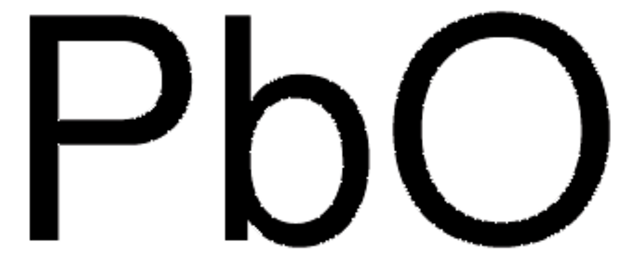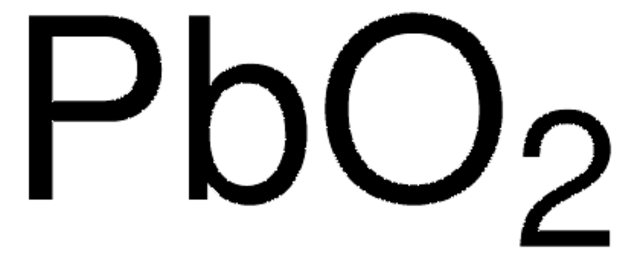243582
Lead(II) carbonate basic
−325 mesh
Synonym(s):
Lead(2+) dicarbonate dihydroxide, Trilead bis(carbonate) dihydroxide
About This Item
Recommended Products
Assay
78.0-82.0% Pb basis (EDTA titration)
Quality Level
form
powder
particle size
−325 mesh
mp
400 °C (dec.) (lit.)
SMILES string
[PbH2++].[PbH2++].O[PbH2]O.[O-]C([O-])=O.[O-]C([O-])=O
InChI
1S/2CH2O3.2H2O.3Pb/c2*2-1(3)4;;;;;/h2*(H2,2,3,4);2*1H2;;;/q;;;;3*+2/p-6
InChI key
RYZCLUQMCYZBJQ-UHFFFAOYSA-H
Looking for similar products? Visit Product Comparison Guide
General description
Application
- As a precursor to synthesize formamidinium lead iodide perovskite nanocrystals, for optoelectronic devices.
- To fabricate Pb3(OH)2(CO3)2/C anode materials for lithium-ion batteries.
Signal Word
Danger
Hazard Statements
Precautionary Statements
Hazard Classifications
Acute Tox. 4 Inhalation - Acute Tox. 4 Oral - Aquatic Acute 1 - Aquatic Chronic 1 - Repr. 1A - STOT RE 2
Storage Class Code
6.1C - Combustible acute toxic Cat.3 / toxic compounds or compounds which causing chronic effects
WGK
WGK 3
Flash Point(F)
Not applicable
Flash Point(C)
Not applicable
Personal Protective Equipment
Choose from one of the most recent versions:
Already Own This Product?
Find documentation for the products that you have recently purchased in the Document Library.
Articles
Since the first report of the low-cost dye-sensitized solar cell (DSSC) in 1991 by Gratzel and his coworker,1 dye-sensitized solar cells (DSSC) has been regarded as one of the most promising photovoltaic technologies because of their transparent and colorful characteristics, as well as low cost.
Our team of scientists has experience in all areas of research including Life Science, Material Science, Chemical Synthesis, Chromatography, Analytical and many others.
Contact Technical Service









